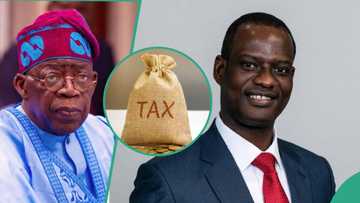Dangote speaks on how much tax he pays as FG plans higher taxes for wealthy Nigerians
- A representative of the Dangote group said a total of N474 billion was paid as tax by the company to the FG in three years.
- The amount was for tax charged on Dangote Sugar, Dangote Cement and Dangote Salt combined.
- He bragged about the group being the biggest taxpayer and highest employer of labour
PAY ATTENTION: Сheck out news that is picked exactly for YOU ➡️ click on “Recommended for you” and enjoy!
In three years, three Dangote Group subsidiaries paid the federal government a total of N474 billion in taxes.
Hashem Ahmed, a representative of the Dangote Group, said this on Thursday, September 28, 2023, during the 18th Abuja International Trade Fair.
Ahmed was speaking at the opening ceremony of the Fair organized by the Abuja Chamber of Commerce and Industry show with the help of additional private and public partners.

Source: UGC
Speaking on the Fair's topic of "Sustainable financing and taxation as drivers of the new economy," Ahmed, who represented the multibillion-dollar group, revealed the exciting detail.
PAY ATTENTION: Сheck out news that is picked exactly for YOU ➡️ find the “Recommended for you” block on the home page and enjoy!
This comes after a report that the federal government has turned its attention to wealthy Nigerians to generate much-needed revenue.
The Federal Inland Revenue Service (FIRS) had earlier stated that the wealthy Nigerians and corporations understate their holdings, depriving the federal and state governments of tax revenues.
Dangote Group focuses on sustainable finance
Extending greetings and best wishes on behalf of the Group President, Aliko Dangote, Ahmed stated that the theme for this year focuses on sustainable financing and taxes.
He said:
“As you may be aware that apart from being the highest employer of labour in the private sector, the Dangote Group is also the biggest tax payer. In just three years, Dangote subsidiaries paid a staggering N474bn to the Federal Government. These are Dangote Sugar, Dangote Cement and Dangote Salt, combined.
In addition to several empowerment and skill-acquisition programmes, CSR initiatives, sponsorship programmes, and philanthropy initiatives totalling several billions of naira, he noted that the Dangote Group has been providing consistent financial support.
He said the group was happy that the federal government was pursuing a tax reform strategy that would aid in widening the tax base and provide crucial funding for constructing the nation's infrastructure.
The Minister of Industry, Trade, and Investment, Doris Uzoka-Anite, stated that the government had started a plan to support new and small enterprises in response to Nigeria's current economic challenges.
Uzoka-Anite stated that the ministry intends to spend N75 billion by March 2024 to strengthen the manufacturing sector. She was represented by Kaura Irimiya, Director of Commodity and Export at FMITI.
Additionally, she stated that each of the 774 local governments in the federation would get minor payments for microbusinesses.
“We have also earmarked a fund of N75bn that will be used to support up to 100,000 start-ups and MSMEs at single digital interest rates repayable over 36 months.”
She noted the company earlier this year, in cooperation with Microsoft, introduced the National Technology Export Programme. She claims that the African Development Bank and other partners invested over $600 million in the scheme for digital and creative enterprises.
Nigeria, Cameroon, 8 others pay highest corporate tax in Africa
In related news, Legit.ng reported that the corporate tax rate is a significant source of revenue for governments around the world. Globally, corporate tax rates vary and reflect the distinct economic requirements of every nation.
It is a charge that the government levies against a company's income. Its amount is determined by the net profits businesses make from operating their businesses, often over one fiscal year.
Natural resource-rich nations, for instance, frequently derive the majority of their tax revenue from high corporate taxes on oil and natural gas corporations, allowing other industries to thrive in a setting with comparatively low taxes.
Source: Legit.ng





